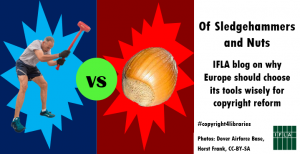 The European Parliament’s vote on the draft copyright directive next Wednesday is likely to be the last chance for transparent discussion on the substance of a reform that has been years in the making. It is also a last chance for libraries to reach out to and influence Members of the European Parliament.
The European Parliament’s vote on the draft copyright directive next Wednesday is likely to be the last chance for transparent discussion on the substance of a reform that has been years in the making. It is also a last chance for libraries to reach out to and influence Members of the European Parliament.
A key message will be that European law-makers must choose wisely, and ensure that they are creating rules that are targeted, proportionate, and respect the public interest.
The Draft Copyright Directive
The last wide-ranging piece of EU copyright legislation dates to 2001. Since then, we have seen new technologies and expectations from users, dramatic evolutions in the market for music and media, and an explosion in the amount of copyrighted material produced every day online.
The draft Directive seeks to take stock of these changes, addressing questions around text and data mining, digital education, preservation, use of works which are no longer on sale, rights of press publishers and the obligations of content-sharing platforms, amongst other issues.
The debate has been intense, with a particular focus on Google and YouTube. It has, often, come across as a dramatic struggle between big technology companies and creators.
The problem with this approach is that tends to lead to dramatic solutions – sledgehammers to crack nuts. This blog illustrates just two areas where such dramatic solutions are being proposed, and the harm that they risk doing to libraries and their users.
Repositories are not YouTube
Perhaps the most contentious part of the Directive has been Article 13, which deals with the responsibility of content-sharing platforms to remove copyright-infringing materials uploaded by users.
While this covers commercial operations such as YouTube, other sites, such as educational and scientific repositories run by libraries and others also help people share their work. As such, they risk falling under the same rules.
For example, scientific repositories are a vital part of the infrastructure for open access. They host copies of research articles – often pre-print (i.e. not final) versions – allowing people who aren’t registered at the wealthiest universities or research institutions to have access. For doctors, individual researchers, and people in developing countries, this can be essential.
Educational repositories play a major role in spreading Open Educational Resources (OERs). These offer exciting possibilities for teachers to find and use materials which may be better tailored to their needs than traditional textbooks.
The repositories that host these materials are clearly working in the public interest, and are often hosted by libraries, education or research institutions. As concerns their size, resources, and objectives, they have little in common with YouTube.
However, the draft Directive risks treating them in the same way, placing the same regulations and responsibilities upon them. While YouTube can deal with this, it is hard to imagine repositories working on small budgets, and a strong aversion to legal risk, doing the same. See our blog on the risks around Article 13 and filtering for more.
Libraries are not Pirates
The desire to fight piracy of copyrighted content extends beyond Article 13. Elsewhere in the directive, organisations representing certain rightholders have made major efforts to impose restrictions on what libraries can do, claiming that this will help limit infringement.
For example, proposals on text and data mining (TDM) could make it very easy to restrict access to materials on the grounds of security, or force researchers to delete the datasets they create as part of the process. Such steps would create a major disincentive to invest time and effort in TDM.
Why do so when access to materials is uncertain, when the work that goes into structuring data will be lost, and when others will not be able to verify the results? Libraries already take care to respect copyright, and do not need further restrictions.
Similarly, there have been major efforts to prevent libraries from taking preservation copies of works held on third-party servers. In a digital world, this is the case for a growing share of what libraries offer their users. Excluding these eBooks, articles and other materials undermines a core mission of libraries, and increases the risk that these works in question being lost in future.
Finally, an amendment proposed to Article 6 of the directive would stop libraries using more than one exception at once. In practical terms, libraries would have to choose between taking a preservation copy of a work, carrying out text and data mining on it, or using it for teaching.
This would be a bizarre situation, with libraries forced to select which of their public interest missions they want to fulfil with works in their collections. It is also unnecessary, as whatever libraries do is still governed by copyright law, and in particular the obligation not to cause unjustified prejudice to rightholders. Libraries should not be forced to choose.
There are other areas where misguided rule-making risks doing more harm than good. Indeed, there is a strong argument that it is competition law, not copyright, that provides the best response to the market dominance of just a few major platforms.
While we will have to wait to see if Europe’s competition authorities act in this area. In the meanwhile – and particularly next Wednesday, it will be important to ensure that European law-makers choose their tools wisely.